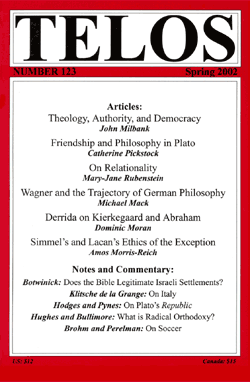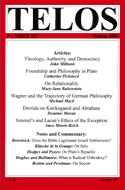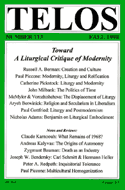In “The Crisis of Capitalist Democracy,” from Telos 152 (Fall 2010), Adrian Pabst “charts the rise of capitalist democracy” in its conceptual and historical origin, and then in its empirical and contemporary manifestation, before presenting an alternative. This alternative seeks the re-emergence of an autonomous realm of “civil society” that is not subsumed by either the free market or the liberal democratic state. Pabst begins by sketching the collusion of capitalism and democracy and their subsequent fusing into modern “market-states.” Representative democracy, in the same way that free-market capitalism creates abstract, virtual value from local and material processes, “tends toward the formalization and abstraction of politics from the people it purports to represent.” The collusion, therefore, of democratic states with free-market capitalism has led to a third-way combination of “some of the worst elements of the left and the right.”
|
Christopher Lasch’s “Liberalism and Civic Virtue,” from Telos 88 (Summer 1991), seeks to gain a better understanding of the internal contradictions of liberalism in one of its most optimistic moments. With the fall of the Berlin Wall, Western economic and political liberalism stood as the last-remaining major ideology of the twentieth century. Amidst the euphoric optimism surrounding the “end of history,” Lasch looks at the challenges that liberalism, with no major competitors on the world stage, poses to itself rather than those posed to it from the outside; for it might just be that liberalism itself is decaying like other major twentieth-century ideologies, though this process is merely delayed.
In their article “What is Radical Orthodoxy?” (Telos 123, Spring 2002), John Hughes and Matthew Bullimore map out, in a short space and yet with crisp detail, the main themes in the Radical Orthodoxy project. For those familiar with the movement, their points will not come as a shock: that a deep metaphysical violence underlies modernity, political liberalism, and capitalism; that the philosophical and theological dualisms of modernity must be named and then overcome with the aid of both premodern and postmodern thought; and that in the face of proliferating violence it is Christian orthodoxy—in line with Aquinas, Boethius, Augustine, Gregory of Nyssa, and Iamblichean Neo-Platonism—that presents truly “radical” alternatives to the prevailing political, philosophical, and theological orders. |
||||
|
Telos Press Publishing · PO Box 811 · Candor, NY 13743 · Phone: 212-228-6479 Privacy Policy · Data Protection Copyright © 2024 Telos Press Publishing · All Rights Reserved |
||||
 Mention “Radical Orthodoxy” in a room of people who are either quite intimately or only remotely acquainted with contemporary theology, and one surely will receive equal parts of praise and scorn. Whether it is being praised or scorned, however, it is plain that Radical Orthodoxy has worked its way deep into the fabric of contemporary theological discourse. Since the publication of John Milbank’s Theology and Social Theory in 1992, Catherine Pickstock’s After Writing in 1997, and Radical Orthodoxy: A New Theology, edited by Milbank, Pickstock, and Graham Ward in 1998, the Radical Orthodoxy movement has done what any explosively innovative intellectual movement will do after the hype settles down: mature or wither away.
Mention “Radical Orthodoxy” in a room of people who are either quite intimately or only remotely acquainted with contemporary theology, and one surely will receive equal parts of praise and scorn. Whether it is being praised or scorned, however, it is plain that Radical Orthodoxy has worked its way deep into the fabric of contemporary theological discourse. Since the publication of John Milbank’s Theology and Social Theory in 1992, Catherine Pickstock’s After Writing in 1997, and Radical Orthodoxy: A New Theology, edited by Milbank, Pickstock, and Graham Ward in 1998, the Radical Orthodoxy movement has done what any explosively innovative intellectual movement will do after the hype settles down: mature or wither away.  In his article “The Last of the Last: Theology, Authority, and Democracy,” from Telos 123 (Spring 2002), John Milbank argues that theology’s proper role is within the Church extended through time and space, rather than as “‘a public discourse’ answerable to the critical norms and liberal values.” Yet his claim does not come without qualification. Many aspects of theological inquiry that were once held together have splintered since 1300 CE: faith and reason, scripture and tradition, and theology under ecclesial authority, in particular. Here the Church is actually more to blame, both Protestantism and Post-Tridentine Catholicism, than some (fictional) increasingly enlightened and liberated society.
In his article “The Last of the Last: Theology, Authority, and Democracy,” from Telos 123 (Spring 2002), John Milbank argues that theology’s proper role is within the Church extended through time and space, rather than as “‘a public discourse’ answerable to the critical norms and liberal values.” Yet his claim does not come without qualification. Many aspects of theological inquiry that were once held together have splintered since 1300 CE: faith and reason, scripture and tradition, and theology under ecclesial authority, in particular. Here the Church is actually more to blame, both Protestantism and Post-Tridentine Catholicism, than some (fictional) increasingly enlightened and liberated society.  Catherine Pickstock’s “Liturgy and Modernity,” from Telos 113 (Fall 1998), is an effort to find an alternative to liberal individualism and social fragmentation in modernity. Pickstock finds this alternative in liturgy: a liturgical critique of modernity where “liturgy” functions as a thoroughly political category. Liturgy is specially equipped to confront modernity due to its nature as ritual behavior (and therefore universal among humans). Yet the liturgical is to be favored over “ritual” for two reasons. First, ritual has already been relegated to its own “delimited sphere” in modernity, where it is viewed as a private superstructural category. Furthermore, ritual in the modern mind is regarded merely as “mechanical repetitions divorced from any informing narrative.” Liturgy, on the other hand, responds to the former challenge by its nature as “a pattern of social action” (not a delimited sphere) and responds to the latter by its foundation in a “privileged transcendent signifier.”
Catherine Pickstock’s “Liturgy and Modernity,” from Telos 113 (Fall 1998), is an effort to find an alternative to liberal individualism and social fragmentation in modernity. Pickstock finds this alternative in liturgy: a liturgical critique of modernity where “liturgy” functions as a thoroughly political category. Liturgy is specially equipped to confront modernity due to its nature as ritual behavior (and therefore universal among humans). Yet the liturgical is to be favored over “ritual” for two reasons. First, ritual has already been relegated to its own “delimited sphere” in modernity, where it is viewed as a private superstructural category. Furthermore, ritual in the modern mind is regarded merely as “mechanical repetitions divorced from any informing narrative.” Liturgy, on the other hand, responds to the former challenge by its nature as “a pattern of social action” (not a delimited sphere) and responds to the latter by its foundation in a “privileged transcendent signifier.” 






